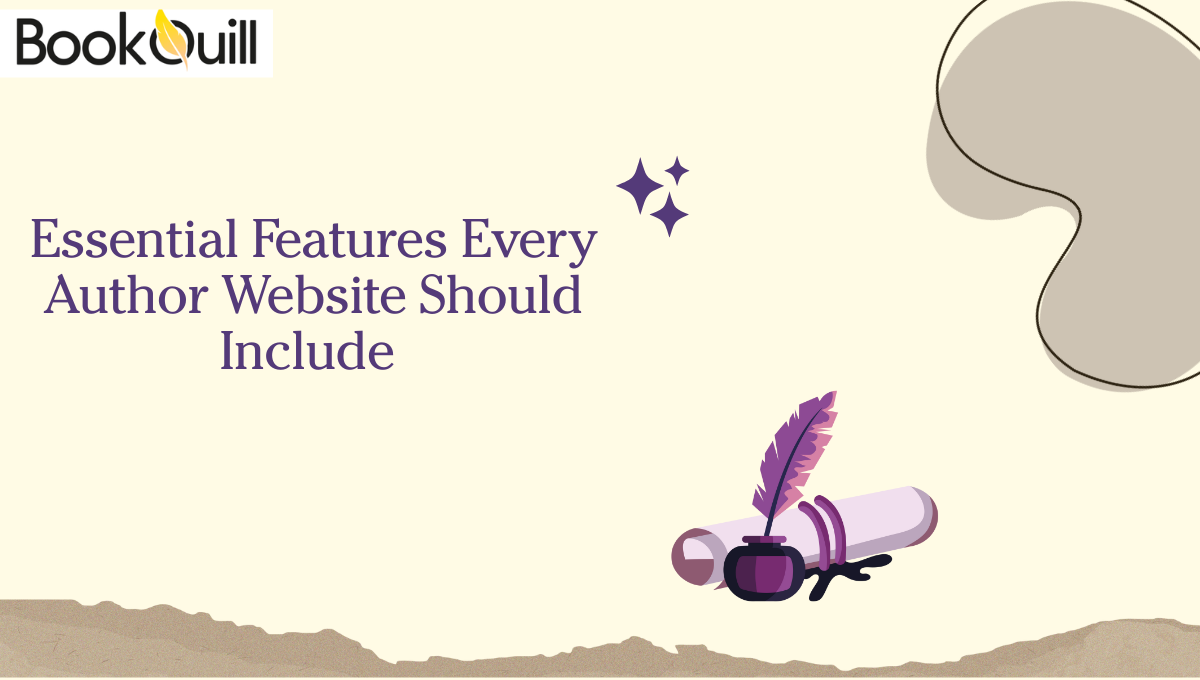Most newbie authors think having a website isn’t that important when you’re just starting out — but that couldn’t be further from the truth. In today’s digital world, an author website is essential, whether you’re a fresh face in publishing or a seasoned storyteller.
Think of it as your online headquarters — part bookstore, part stage, part storytelling shrine. Yet too many authors treat their websites like forgotten attic boxes: dusty, outdated, and missing half the good stuff.
So, the conundrum of the century: how do you actually create an author website for yourself? What essential features and pages should it have? And most importantly — what exactly are “author website features”?
To answer all these questions, I suggest you stick around till the end — because by the time you’re done reading, you’ll have everything you need to make your author journey skyrocket to new heights of success.
Why Every Author Needs a Website
Your Digital Headquarters
Forget about the “author website features” for a second—let’s talk about what an author website actually is. It’s not just a collection of pages stuffed with information about you or your books. It’s your literary command center.
This is where readers, publishers, and the media come to understand who you are and what you stand for. Think of it as the beating heart of your author brand—the one corner of the internet that’s entirely yours. No algorithms to chase, no fleeting trends to follow.
Beyond Social Media
You might be thinking, why go through all the hassle when you can just promote yourself on social media? That’s where you’re wrong. Social media is great for discovery, but it’s fleeting. Trends change overnight, engagement vanishes in seconds, and one moment you’re the talk of the town—next moment, you’re invisible. Worst of all, you’re at the mercy of someone else’s algorithm. They change the rules, and suddenly you’re stuck with no backup plan.
An author website, on the other hand, is permanent real estate. It doesn’t rely on follower counts or trending hashtags. It’s where you build something that lasts—your own audience. With tools like newsletters, contact forms, and exclusive content, you’re not just collecting followers; you’re building genuine relationships.
And if the idea of building a site sounds overwhelming, don’t worry. The smartest move? Hire professional author website design services. They’re surprisingly affordable, handle the tech headaches for you, and help you build a site that actually looks—and works—like a professional author’s should.
Essential Author Website Features Every Site Must Have
Now that you know why you need a website, let’s talk about author website features it should actually include. They’re the must-haves that make your site professional, personal, and worth visiting.
1. Author Bio & Story
This author website feature is a must-have. Your “About” page is where readers get to know you — not just your books. Keep it conversational and real; talk about what drives your writing, the stories you love to tell, and why you do what you do.
2. Book Showcase
This is your digital bookshelf, Feature clean book covers, short blurbs, and direct “Buy” links. Add a sprinkle of reviews or reader quotes for credibility.
3. Contact & Social Links
Add an author website feature which makes it easy to reach you. Add a visible contact page and link your social profiles neatly. Use a professional email — not the “writerqueen2022” type — and make sure fans, media, or collaborators can find you without effort.
4. Blog or News Section
A blog keeps your website alive. Share updates, writing tips, or book news — anything that lets readers peek behind the curtain. It boosts SEO and keeps your audience engaged between releases.
Pro Tip: Hire affordable author website design services that can create these sections for you, so you can focus on what truly matters — writing.
5. Newsletter Signup
Your email list is your real audience. Add this author website feature with a clean signup form and offer something small in return — a free chapter, sneak peek, or exclusive note. It’s the best way to build long-term readers who actually care.
6. Press or Media Page
Even indie authors need one. Include your bio, headshots, book covers, and contact info for media. A ready-made press kit shows professionalism and makes it easier for others to feature you.
7. Testimonials & Reader Reviews
Let others speak for your work. A few short, genuine quotes from readers or reviewers can do wonders for credibility. Keep them subtle and sincere — real voices always sell better than self-promotion. And if you want this section to look clean and professional, affordable author website designers can style it perfectly to match your brand without breaking your budget.
Final Thoughts
Your author website isn’t just a digital business card — it’s your creative home base, your marketing engine, and your invitation to the world. Every feature, from your bio to your book showcase, works together to tell your story beyond the page. Think of it as your legacy in pixels: where passion meets professionalism. Whether you build it yourself or hire expert author website design services, make it authentically you. Because in a world drowning in noise, authenticity is what turns browsers into lifelong readers.
Everything Authors Need to Know About Websites
1. Why do authors need a website if they already have social media?
Social media is borrowed space; your website is owned territory. Platforms can change their rules or vanish overnight — but your website stays under your control, building your brand and audience for the long haul.
2. What are the most important author website features?
Every author website should include:
- A compelling bio
- A book showcase with purchase links
- A blog or updates section
- Newsletter signup
- Contact and social links
- A press/media page
- Reader testimonials or reviews
3. Should I build my author website myself or hire a professional?
If you’re tech-savvy and have time, you can DIY. But if you want a site that looks polished, functions flawlessly, and aligns with your author brand, professional design services are worth every penny.
4. How often should I update my author website?
At least once every few months — or whenever you publish something new, get media coverage, or host an event. Regular updates keep readers engaged and your site ranking well on search engines.
5. Can a good website really help me sell more books?
Absolutely. A well-designed website builds trust, showcases your work, and converts curiosity into purchases. It’s your online bookstore, stage, and marketing tool all rolled into one.




